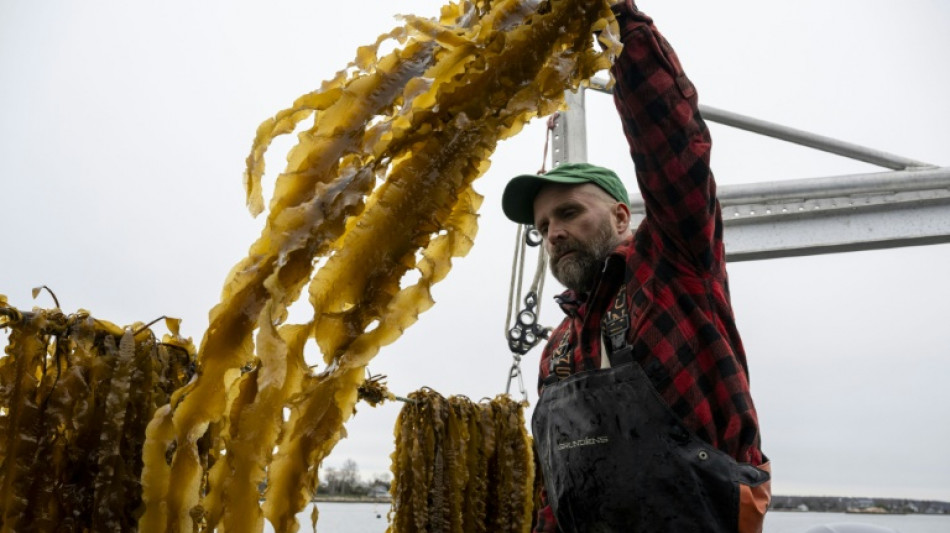
-
 EU warns Meta it must open up WhatsApp to rival AI chatbots
EU warns Meta it must open up WhatsApp to rival AI chatbots
-
Scotland spoil Italy's T20 World Cup debut with big win

-
 Israeli president says 'we will overcome evil' at Bondi Beach
Israeli president says 'we will overcome evil' at Bondi Beach
-
Munsey leads Scotland to 207-4 against Italy at T20 World Cup

-
 Japan restarts world's biggest nuclear plant again
Japan restarts world's biggest nuclear plant again
-
Bangladesh poll rivals rally on final day of campaign

-
 Third impeachment case filed against Philippine VP Duterte
Third impeachment case filed against Philippine VP Duterte
-
Wallaby winger Nawaqanitawase heads to Japan

-
 Thailand's Anutin rides wave of nationalism to election victory
Thailand's Anutin rides wave of nationalism to election victory
-
Venezuela's Machado says ally kidnapped by armed men after his release

-
 Maye longs for do-over as record Super Bowl bid ends in misery
Maye longs for do-over as record Super Bowl bid ends in misery
-
Seahawks' Walker rushes to Super Bowl MVP honors

-
 Darnold basks in 'special journey' to Super Bowl glory
Darnold basks in 'special journey' to Super Bowl glory
-
Japan's Takaichi may struggle to soothe voters and markets

-
 Seahawks soar to Super Bowl win over Patriots
Seahawks soar to Super Bowl win over Patriots
-
'Want to go home': Indonesian crew abandoned off Africa demand wages

-
 Asian stocks track Wall St rally as Tokyo hits record on Takaichi win
Asian stocks track Wall St rally as Tokyo hits record on Takaichi win
-
Bad Bunny celebrates Puerto Rico in joyous Super Bowl halftime show

-
 Three prominent opposition figures released in Venezuela
Three prominent opposition figures released in Venezuela
-
Israeli president says 'we shall overcome this evil' at Bondi Beach

-
 'Flood' of disinformation ahead of Bangladesh election
'Flood' of disinformation ahead of Bangladesh election
-
Arguments to begin in key US social media addiction trial

-
 Dr. Jonathan Spages Expands Diabetes Reversal Practice Across New States, Adds Clinical Team to Meet Growing Demand
Dr. Jonathan Spages Expands Diabetes Reversal Practice Across New States, Adds Clinical Team to Meet Growing Demand
-
Agronomics Limited Announces Net Asset Value Calculation as at 31 December 2025

-
 UK-Based Vesalic Limited Emerges from Stealth with Landmark Discovery of Potential Non-CNS Driver of Motor Neuron Diseases, including ALS, and Breakthrough Therapeutic and Diagnostic Opportunities
UK-Based Vesalic Limited Emerges from Stealth with Landmark Discovery of Potential Non-CNS Driver of Motor Neuron Diseases, including ALS, and Breakthrough Therapeutic and Diagnostic Opportunities
-
Gotterup tops Matsuyama in playoff to win Phoenix Open

-
 New Zealand's Christchurch mosque killer appeals conviction
New Zealand's Christchurch mosque killer appeals conviction
-
Leonard's 41 leads Clippers over T-Wolves, Knicks cruise

-
 Trump says China's Xi to visit US 'toward the end of the year'
Trump says China's Xi to visit US 'toward the end of the year'
-
Real Madrid edge Valencia to stay on Barca's tail, Atletico slump

-
 Malinin keeps USA golden in Olympic figure skating team event
Malinin keeps USA golden in Olympic figure skating team event
-
Lebanon building collapse toll rises to 9: civil defence

-
 Real Madrid keep pressure on Barca with tight win at Valencia
Real Madrid keep pressure on Barca with tight win at Valencia
-
PSG trounce Marseille to move back top of Ligue 1

-
 Hong Kong to sentence media mogul Jimmy Lai in national security trial
Hong Kong to sentence media mogul Jimmy Lai in national security trial
-
Lillard will try to match record with third NBA 3-Point title

-
 Vonn breaks leg as crashes out in brutal end to Olympic dream
Vonn breaks leg as crashes out in brutal end to Olympic dream
-
Malinin enters the fray as Japan lead USA in Olympics team skating

-
 Thailand's Anutin readies for coalition talks after election win
Thailand's Anutin readies for coalition talks after election win
-
Fans arrive for Patriots-Seahawks Super Bowl as politics swirl

-
 'Send Help' repeats as N.America box office champ
'Send Help' repeats as N.America box office champ
-
Japan close gap on USA in Winter Olympics team skating event

-
 Liverpool improvement not reflected in results, says Slot
Liverpool improvement not reflected in results, says Slot
-
Japan PM Takaichi basks in election triumph

-
 Machado's close ally released in Venezuela
Machado's close ally released in Venezuela
-
Dimarco helps Inter to eight-point lead in Serie A

-
 Man City 'needed' to beat Liverpool to keep title race alive: Silva
Man City 'needed' to beat Liverpool to keep title race alive: Silva
-
Czech snowboarder Maderova lands shock Olympic parallel giant slalom win

-
 Man City fight back to end Anfield hoodoo and reel in Arsenal
Man City fight back to end Anfield hoodoo and reel in Arsenal
-
Diaz treble helps Bayern crush Hoffenheim and go six clear


A leader in US seaweed farming preaches, teaches and builds a wider network
Bren Smith and his GreenWave organization are helping lay the foundations for a generation of seaweed-growing farmers in the United States, while working to build a network of producers and buyers.
Seen from a boat, GreenWave's farm seems unimpressive -- little more than lines of white and black buoys, a few hundred yards (meters) off the Connecticut coast.
But beneath the dark Atlantic waters, suspended from ropes tied between the buoys around six feet (two meters) down, seaweed in varying shades of brown undulates.
GreenWave, which uses no pesticides or herbicides, last year harvested more than 20 metric tons of kelp from this location and from another one a bit farther east.
While seaweed-farming has been practiced for decades in Asia, such aquaculture is a relatively new phenomenon in the US.
- Training others -
Bren Smith, who is Canadian, worked in industrial fishing for years before turning to so-called regenerative aquaculture -- cultivating marine resources while caring for their ecosystem and even helping it flourish.
Research shows that kelp absorbs more carbon dioxide (CO2) than a land forest of comparable surface area, while providing nutrients and a habitat for other living organisms.
Once an crop is harvested, it is used primarily in food products, cosmetics or as natural fertilizer.
GreenWave also cultivates mussels and oysters, which help purify surrounding seawater.
But its ambition reaches far beyond the bounds of its sea "farm," which has been kept intentionally small.
"We're training the next generation of ocean farmers," said Smith, author of the book "Eat Like a Fish: My Adventure as a Fisherman Turned Ocean Farmer."
To do so, GreenWave has developed a suite of training tools, from brochures to videos. Nearly 8,000 people have profited from the training.
GreenWave helped "connect me to other farms and farmers and disseminate the knowledge that our industry is building," said Ken Sparta, who has been growing seaweed on his Spartan Farms near Portland, Maine since 2019.
"I'm not sure where our industry would be without them, and it certainly wouldn't be growing at this rate," Sparta said.
- 'Collaborate, not compete' -
GreenWave also issues starter grants of up to $25,000 per project, thanks to a combination of private donations and public subsidies.
And it established the Seaweed Source platform, which brings producers together with buyers, with more than 65 companies now involved.
Crucially, GreenWave developed an inexpensive technique allowing harvested seaweed to be preserved for up to 10 months, whereas kelp generally begins deteriorating after only a few hours.
"We don't do policy stuff," said Smith, standing on the bridge of his small boat. "It's just, like, what do you need to do to be successful?"
Despite seaweed's proven ability to capture carbon dioxide, Smith has not yet tried to include carbon credits in his business model.
"It's seeming like markets aren't great at incentivizing carbon," the 51-year-old told AFP.
Along with GreenWave co-founder Emily Stengel, Smith has had to confront the challenges of a warming climate.
"When Bren started farming, he would be out planting in maybe the end of October," said Toby Sheppard Bloch, director of infrastructure at GreenWave.
"And in 2021, we were out planting at the end of December... We lost two months of growing season," due to warming waters.
With harvests plummeting, "We realized that something had to change if we were going to continue to farm these waters," said Bloch.
GreenWave had the idea of creating a seed bank -- where seeds could get an early start before being put in the sea -- which helped farmers gain two months of growing time.
They used electric wine coolers as a cheaper alternative to a laboratory cold room.
The seed bank is open to any farmer to use, and seeds can be deposited or taken out at any time.
"Our belief is, really, what we need to do is collaborate and not compete," said Smith, wearing his trademark green cap.
"Let's bring together fishermen and all these folks that are being impacted by climate change and move them into solutions and breathing life back into the ocean."
P.Silva--AMWN


